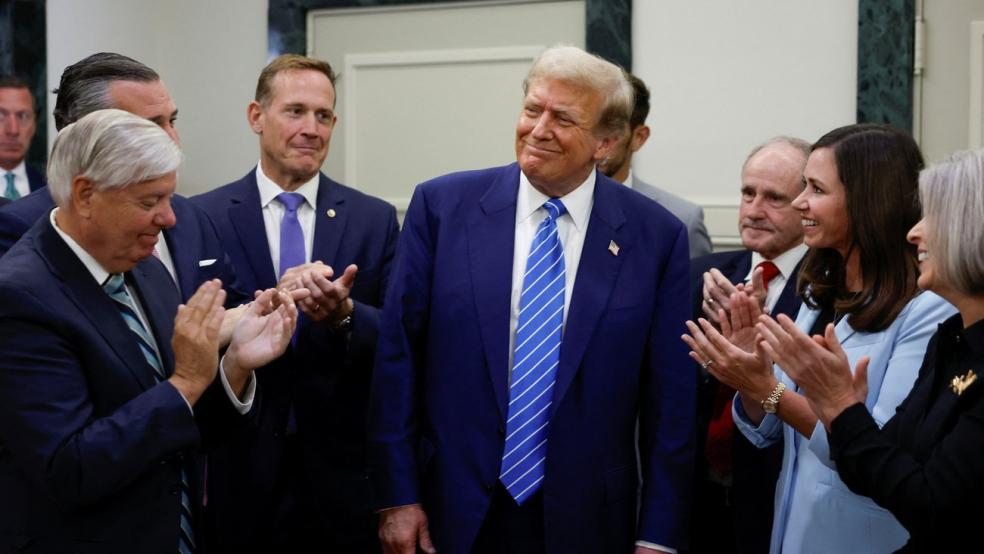Former President Donald Trump huddled with congressional Republicans Thursday in his first visit to Capitol Hill since the partisan violence of January 6, 2021. Then he reportedly promised a Business Roundtable gathering of CEOs that he would cut the corporate tax rate to 20% if he wins another term in the White House.
The 2017 Republican tax cuts enacted during Trump’s first term slashed the corporate rate from 35% to 21%. The corporate change was made permanent while cuts to individual taxes were set to expire after 2025 to reduce the official cost of the plan. Republicans want to renew those expiring cuts and see a second Trump term as an opportunity to lower taxes further.
At a private event Thursday hosted by the Business Roundtable, an association of CEOs, Trump pledged to make the 2017 law permanent and further trim the corporate rate to 20%, Bloomberg’s Nancy Cook reports. She adds that Trump called the 20% figure a nice, round number and notes that “even a small reduction represents a tax cut worth billions of dollars each year for profitable US companies.”
Trump reportedly also promised to slash regulations if he becomes president again.
The tax talk in front of CEOs followed Trump’s visits earlier in the day with Republican lawmakers. Those intraparty discussions were reportedly supposed to touch on Trump’s vision for a 2025 policy agenda, including taxes and entitlements, but were instead — perhaps inevitably — dominated by gripes and grievances as the former president basked in his GOP support and took aim at his critics. (Politico’s Rachael Bade reported Thursday that, in the days after guilty verdicts were handed down against him on 34 felony counts in New York, Trump called the speaker seeking to have Congress help him get revenge and overturn his conviction.)
“I didn’t hear any agenda talk,” Republican Rep. Mark Amodei of Nevada told reporters. “It was a pep talk.” Asked if Trump supports the House GOP leadership team, Speaker Mike Johnson told reporters: “He said very complimentary things about all of us. We had sustained applause. He said I’m doing a very good job. We’re grateful for that.”
Trump didn’t steer entirely clear of policy talk, though. He reportedly urged lawmakers to discuss abortion access as a state issue, floated tariff increases as a way to pay for his tax cuts, and again raised the idea of eliminating taxes on service workers’ tips, which he first mentioned at a recent Las Vegas rally.
“President Trump simply floated the idea [of higher tariffs] as one of many brought up during the conversation, and he has said many times that as tariffs on foreign countries go up, taxes on American workers can come down,” campaign spokeswoman Karoline Leavitt said in a statement to Bloomberg. “President Trump’s top priority remains making the Trump Tax Cuts permanent.”
That approach ignores the fact that tariffs imposed on foreign goods are paid by American consumers.
What it all means: Trump has promised another round of sweeping — and costly — tax cuts if he wins in November. At a rally last month in New Jersey he told the crowd: “Instead of a Biden tax hike, I’ll give you a Trump middle class, upper class, lower class, business class big tax cut.”
Biden, meanwhile, wants to raise taxes on the wealthy and large, profitable businesses while preserving the lowered tax rates for those earning less than $400,000 a year.
The differing approaches to the expiring tax law represent a key issue at stake in November. “Although congressional Republicans haven’t specified how they’ll finance this round of tax cuts, every major Republican tax cut for the wealthy or corporations in recent decades has put the burden on middle- and low-income Americans, and this time will be no different,” Lael Brainard, director of Biden’s National Economic Council, told reporters Wednesday.
HuffPost’s Jonathan Nicholson reports that Brainard said there are four ways the GOP could look to offset at least some of the cost of their tax plans: “She said they could use revenues from the 10% across-the-board tariff Trump has proposed on imported goods; they could cut entitlement programs like Social Security and Medicare; they could cut annual spending by federal agencies and programs excluding defense; or they could simply borrow, adding the costs of the tax cuts to the public debt.”
“One way or another, the American people will pay the price for the congressional Republican approach,” Brainard said.





